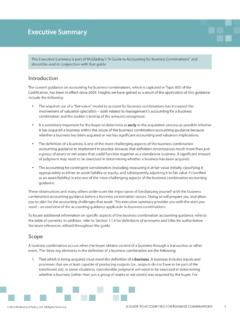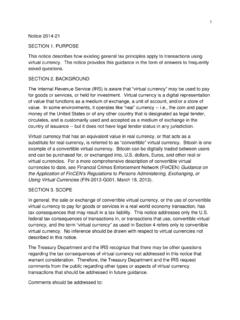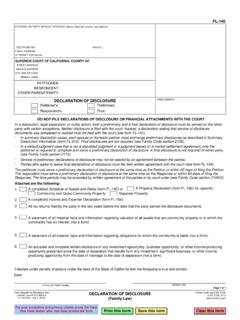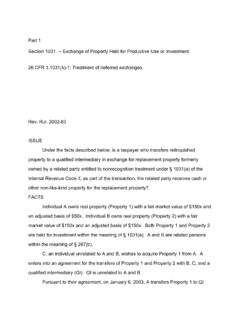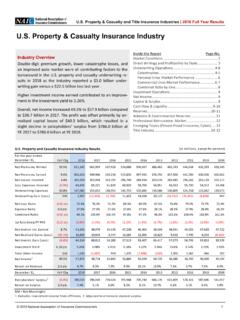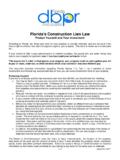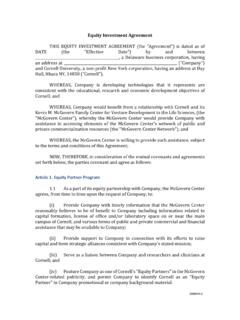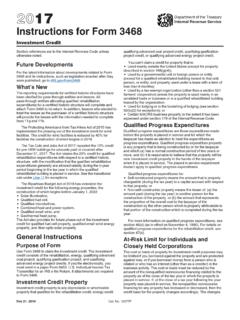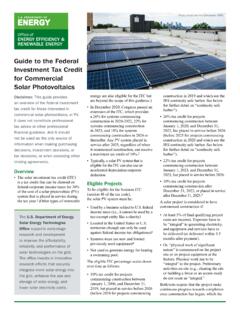Transcription of U.S. GAAP vs. IFRS: Property, plant and equipment and ...
1 GAAP vs. IFRS: property , plant and equipment and investment property Prepared by: Richard Stuart, Partner, National Professional Standards Group, RSM US LLP +1 203 905 5027 February 2020 Introduction Currently, more than 120 countries require or permit the use of International Financial Reporting Standards (IFRS), with a significant number of countries requiring IFRS (or some form of IFRS) by public entities (as defined by those specific countries). Of those countries that do not require use of IFRS by public entities, perhaps the most significant is the The Securities and Exchange Commission (SEC) requires domestic registrants to apply generally accepted accounting principles (GAAP), while foreign private issuers are allowed to use IFRS as issued by the International Accounting Standards Board (which is the IFRS focused on in this comparison).
2 While the SEC continues to discuss the possibility of allowing domestic registrants to provide supplemental financial information based on IFRS (with a reconciliation to GAAP), there does not appear to be a specified timeline for moving forward with that possibility. Although the SEC currently has no plans to permit the use of IFRS by domestic registrants, IFRS remains relevant to these entities, as well as private companies in the , given the continued expansion of IFRS use across the globe. For example, many companies are part of multinational entities for which financial statements are prepared in accordance with IFRS, or may wish to compare themselves to such entities. Alternatively, a company s business goals might include international expansion through organic growth or acquisitions. For these and other reasons, it is critical to gain an understanding of the effects of IFRS on a company s financial statements.
3 To start this process, we have prepared a series of comparisons dedicated to highlighting significant differences between GAAP and IFRS. This particular comparison focuses on the significant differences between GAAP and IFRS when accounting for property , plant and equipment and investment property . The guidance related to accounting for property , plant and equipment in GAAP is included in the Financial Accounting Standards Board s Accounting Standards Codification (ASC) Topic 360, property , plant , and equipment . In IFRS, the guidance related to accounting for property , plant and equipment is included in International Accounting Standard (IAS) 16, property , plant and equipment , and the guidance related to accounting for investment property is included in IAS 40, investment property . 2 AUDIT | FEBRUARY 2020 Comparison The significant differences between GAAP and IFRS with respect to accounting for property , plant and equipment and investment property are summarized in the following table.
4 GAAP IFRS Relevant guidance ASC 360 IAS 16 and 40 Depreciation Component depreciation is permitted, but is not used often. Depreciation of individual components is required when the components lives are different. Major overhaul costs Various alternatives are available to account for the costs of performing a major overhaul, including: (a) expensing the costs as incurred, (b) accounting for the overhaul as a separate component and (c) deferring the costs and amortizing them over the period of benefit. Costs of performing a major overhaul are required to be capitalized if the overhaul represents a replacement of a previously identified component (if the future economic benefits are probable and reliably measurable). Revaluation Revaluation is not allowed. An entity may elect to apply the revaluation model, which allows the entity to measure property , plant and equipment at fair value.
5 If elected, the model must be applied to entire classes of assets. investment property No specific guidance exists. Generally, real estate companies and operating companies account for investment -type property using historical cost. Investor entities generally account for their investments in investment -type property at fair value. No option exists to account for leased property at fair value. investment property is defined as property held to earn rentals or for capital appreciation, or both. An entity is permitted to record investment property at fair value, with changes in fair value recognized in the income statement. The option to account for the property at fair value applies to leased property . These are the significant differences between GAAP and IFRS with respect to accounting for property , plant and equipment and investment property , except for differences related to impairment accounting (which are covered in another of our comparisons, GAAP vs.)
6 IFRS: Impairment of long-lived assets). Refer to ASC 360 and IAS 16 and 40 for all of the specific requirements applicable to 3 AUDIT | FEBRUARY 2020 accounting for property , plant and equipment and investment property . In addition, refer to our GAAP vs. IFRS comparisons series for more comparisons highlighting other significant differences between GAAP and IFRS. Consult your RSM US LLP service provider concerning your situation and any specific questions you may have. You may also contact us toll-free at for a contact person in your area. +1 800 274 3978 GAAP vs. IFRS: property , plant and equipment and investment property resulted from the efforts and ideas of various RSM US LLP professionals, including members of the National Professional Standards Group, as well as contributions from RSM UK and RSM Canada professionals.
7 This document contains general information, may be based on authorities that are subject to change, and is not a substitute for professional advice or services. This document does not constitute audit, tax, consulting, business, financial, investment , legal or other professional advice, and you should consult a qualified professional advisor before taking any action based on the information herein. RSM US LLP, its affiliates and related entities are not responsible for any loss resulting from or relating to reliance on this document by any person. Internal Revenue Service rules require us to inform you that this communication may be deemed a solicitation to provide tax services. This communication is being sent to individuals who have subscribed to receive it or who we believe would have an interest in the topics discussed.
8 RSM US LLP is a limited liability partnership and the member firm of RSM International, a global network of independent audit, tax and consulting firms. The member firms of RSM International collaborate to provide services to global clients, but are separate and distinct legal entities that cannot obligate each other. Each member firm is responsible only for its own acts and omissions, and not those of any other party. Visit for more information regarding RSM US LLP and RSM International. RSM, the RSM logo and the power of being understood are registered trademarks of RSM International Association. 2020 RSM US LLP. All Rights Reserved.


